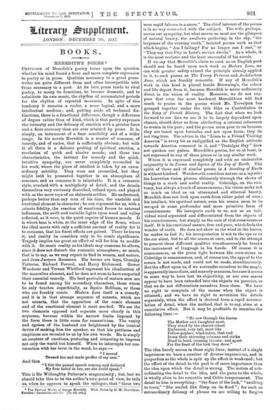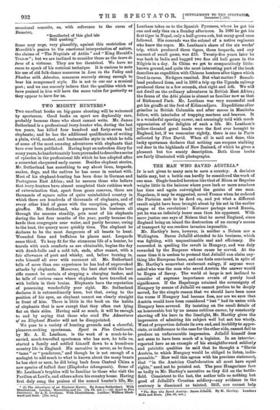BOOKS.
MEREDITH'S POEMS.* CRITICISM of Meredith's poetry turns upon the question whether his mind found a freer and more complete expression
in poetry or in prose. Qualities necessary to a great prose- writer are quite different from and often incompatible with
those necessary to a poet. At its best, prose tends to rival poetry, to usurp its functions, to become dramatic, and to substitute its own music, the rhythm of accumulated periods for the rhythm of repeated measures. In spite of this
tendency it remains a cooler, a more logical, and a more intellectual medium ; and, putting aside all technical dis- tinctions, there is a functional difference, though a difference of degree rather than of kind, which is that poetry expresses the intensity and the delicacy of emotion with a greater force
and a finer accuracy than are ever attained by prose. It is, simply, an instrument of a finer sensibility and of a wider range. In his novels Meredith is a master of romance, of
comedy, and of satire, that is sufficiently obvious ; but with it all there is a delicate probing of spiritual emotion, a revelation of quick and elusive moods; and these two characteristics, the instinct for comedy and the quick, intuitive _ sympathy, are never completely reconciled in his work, where the place of intellect is taken by an extra- ordinary subtility. They were not reconciled, but they might both be presented together in an atmosphere of romance, and as romance it is inimitable. It is a romantic style, overlaid with a multiplicity of detail, and the details themselves very curiously described, refined upon, and played with as the mere toys of an elaborate artifice. He understood, perhaps better than any man of his time, the unstable and irrational element in character; he can represent for us, with a minute fidelity, the reaction of emotional forces to external influences, the swift and variable lights upon wood and valley reflected, as it were, in the quick caprice of human moods. It is where heat is white, at the inner edge of the flame, where the ideal meets with only a sufficient amount of reality for it to consume, that his finest effects are gained. There he leaves it, and reality he considers only in its comic significance.
Tragedy implies too great an effort of will for him to meddle with it. So much reality as his ideals may consume he allows, since it does not disturb the romantic atmosphere ; so much, that is to say, as we may expect to find in women, and nature, and Jean-Jacques Rousseau. His heroes are boys, Crossjay Patterne, Richard Feverel, and Harry Richmond. Gower
Woodseer and -Vernon Whitford represent his idealization of the masculine element, and he does not seem to have suspected their essential comedy. His best portraits of mature men are
to be found among his secondary characters, those whom he only touches superficially, as Squire Beltham, or those
who are frankly comic. Modern Love itself is a comedy,
and it is in that strange sequence of sonnets, which are not sonnets, that the opposition of the comics element and of the emotional element is most marked. We see the two elements opposed and separate more clearly in this sequence, because within the narrow limits imposed by the form there is little room for romanticism. The vanity and egoism of the husband are heightened by the ironical device of making him the speaker, so that his pettiness and emptiness are revealed to us by his own words. He is simply an amateur of emotions, posturing and simpering to impress not only the world but himself. When he interrupts her con- versation with her lover in the wood, he says :—
" I moved
Toward her and made proffer of my arm."
And then "I felt the pained speech coming and declared My firm belief in her, ere she could speak."
This is Sir Willoughby Patterne's magnanimity ; but, lest we should take this to be the author's own point of view, he tells us, when he appears to speak the epilogue, that " these two
• The Poetical Works of George Meredith. With Notes by Cl. M. Treyelyan. London : Constable and Co. [7s. 6& net.] were rapid falcons in a snare." The chief interest of the poems is in no way connected with the subject. The wife, perhaps,
moves our sympathy, but what moves us most are the glimpses of natural beauty, the swallows gathering in the sky, "the
largeness of the evening earth," isolated poems such as that which begins, "Am I failing P For no longer can I cast," or
"They say that Pity in Love's service dwells." As a whole, it is the most realistic and the least successful of his novels.
If we say that Meredith's claim to rank as an English poet should not be based upon such work as Modern Love, we can with greater safety extend the principle already applied to it, to such poems as The Young Princess and Archduchess Anne, which are frankly romantic. If any of Meredith's work in this kind is placed beside Browning's, the colour and life depart from it, because Meredith is never sufficiently
direct in his vision of reality. Moreover, we do not sup- pose that even the most hardened Meredithian will find
much to praise in the poems which Mr. Trevelyan has grouped together under the title Odes in Contnbution to the Song of French History. The fact that when we look forward to our fate we see it to be largely dependent upon
chance, should deter us from attributing a rational coherence to events in the past ; and the poems seem poor to us because
they are based upon formulas and not upon facts; they do not ring true. The advice in the "Lines to a Friend Visiting
America" is every bit as undignified as the English attitude towards America censured in it, and "Trafalgar Day" does not quicken our pulses. Meredith's genius, for us at least, is not expressed in any of these pieces or in any similar work. Where it is expressed completely and with an undeniable
originality is in Poems and Lyrics of the Joy of Earth. The spirit of these and of similar poems in A _Reading of Earth
is without kindred. Wordsworth considers nature as a mystic ; his Lucretian vision pierces ultimately through the shows of things to a stark and awful reality. Coleridge, on the con- trary, has always a touch of sensuousness ; his vision seeks not so much an ideal as an attenuated and ethereal beauty. Meredith does not look upon earth from either point of view ; his intellect, his spiritual nature, even his senses seem to be merged in some profounder and more primitive form of consciousness. He interprets earth to us, not as an indi- vidual mind separated and differentiated from the objects of his consciousness, but simply as the sum of that consciousness
itself. It is his emotional nature, free and pure, which feels the wonder of earth. He does not show us the wind in the leaves, he makes us feel it; his interpretation is not to the eye or to
the ear alone, but to all the senses at once, and in the attempt to present these different qualities simultaneously he breaks the instrument of language in his hands. Of course it is sensuousness, as the green light between the corn-stems in Coleridge is sensuousness, and, of course too, the appeal to the senses is not made, and could not be made, simultaneously.
But the effect upon us, if we surrender ourselves to the magic, is apparently immediate, and scarcely sensuous, because it seems in some way to have lost its objectivity, or our own senses appear to have been extended into the objects we perceive, so that we do not differentiate ourselves from them. We have no right to complain of the means when the object is attained; and we have no right to scrutinize the details separately, when the effect is derived from a rapid accumu- lation of detail, when the method, that is to say, aims at a cumulative effect. But it may be profitable to examine the following lines :—
"He saw through the leaves Tho Mother and Daughter meet
They stood by the chariot-wheel Embraced, very tall, most like
Fellow-poplars, wind-taken, that reel Down their shivering columns and strike Head to head, crossing throats: and apart For the feast of the look they drew."
The idea barely moves in those eight lines; instead of a single impression we have a number of diverse impressions, and in proportion as the whole is split up the effect is weakened ; but the effect of the detail to the poet is of more importance than the idea upon which the detail is strung. The notion of sub- ordinating the detail to the idea, and the parts to the whole, is wholly alien to his romantic and Celtic temperament. The detail to him is everything : "the feast of the look," "exulting to tears," "She smiled like Sleep on its flood "; for such an extraordinary delicacy of phrase we are willing to forgive occasional conceits, as, with reference to the curse of Demeter, "Recollected of this glad isle Still quaking."
Some may urge, very plausibly, against this restriction of Meredith's genius to the emotional interpretation of nature, the claims of " The Nuptials of Attila" and "King Harald's Trance"; but we are inclined to consider these as the tours d,e force of a virtuoso. They are too theatricaL We have no room to speak of his metrical technique. It is curious to note his use of old folk-dance measures in Love in the Valley and Phoebus with Admetus, measures scarcely strong enough to bear his compressed style. He is not to our ear a musical poet ; and we can scarcely believe that the qualities which we have praised in him will have the same value for posterity as they appear to have for us.







































































 Previous page
Previous page